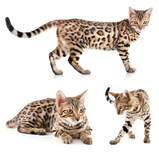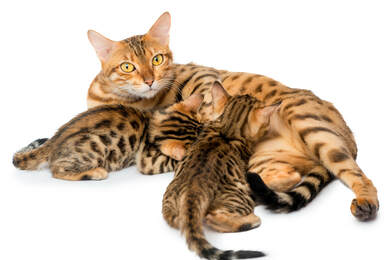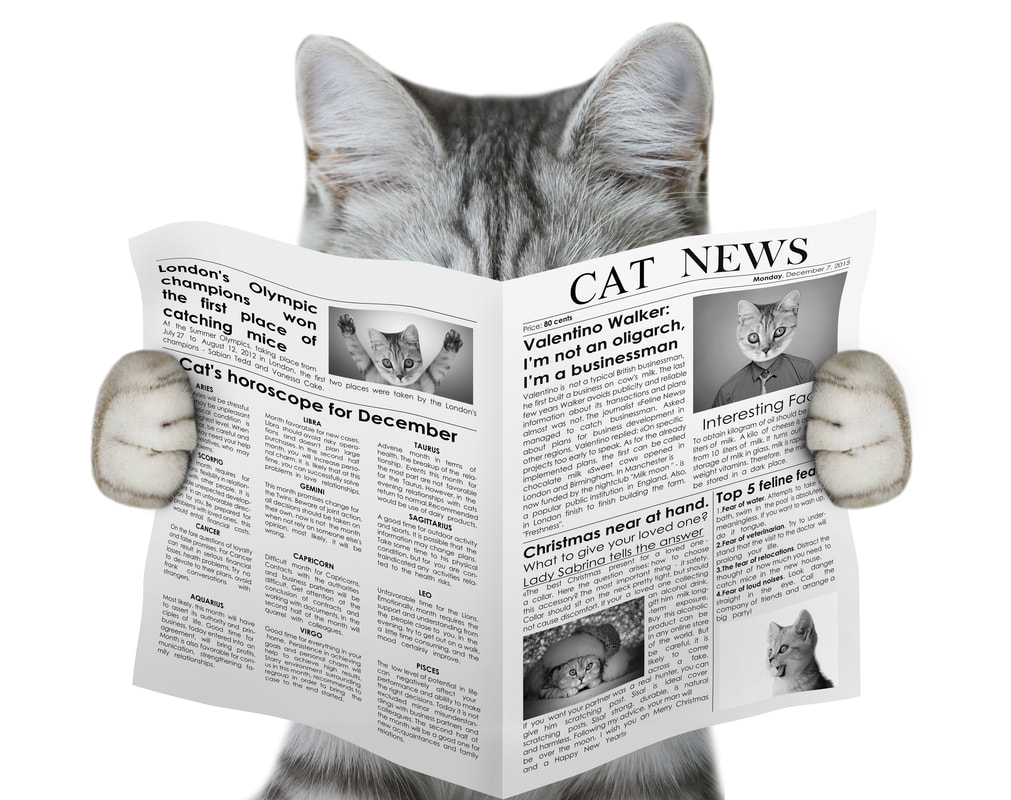 The first thing you should keep in mind is that Vets are a business. Doctors are discouraged from giving expensive tests because they only get reimbursed for a small portion that the insurance company has worked out and they have to work at getting paid for their services. Veterinarians, on the other hand, do not have to negotiate their pay from insurance companies and they don't have to work at getting paid, therefor they have the luxury of being in the business of encouraging every test, and appointment that they can. You should absolutely do your research and shop around to find the perfect balance between competitive prices and reputation. A Cat-only vet is the best choice because there is a more specialized experience there. Micro-Chipping On the first visit to your vet with your new kitten most vets will check for a microchip. Unless a buyer specifically requests it we micro-chip all of our Registered Bengal kittens The positive side to micro-chipping is should your kitten ever leave the house and be returned to a Vet or shelter, the Vet should will be able to find your contact information through the Microchip. Even if the kitten is stolen and eventually brought to a Vet, the Vet can find your information on the microchip and the unsuspecting person can be arrested for Grand theft (anything stolen $1,000+ is Grand theft)! After you purchase your kitten you should call the Chip company that has your kittens micro number and make sure that it's active and in their system and update it to your name and address. The Registered Bengal breeder that you purchased your cat from should give you everything you need to transfer the information to your name and address. Parasite testing As part of routine care, most Vets opt to have a parasite test by having you bring in a fresh stool sample from the litter box which can be tested for worms, Giardia, and/or Coccidia. Unfortunately, these parasites are integrated in a Cat's life from the time that an ancestor ingested them from the wild and become passed throughout generations from mother to offspring while in the uterus or through breastmilk. Therefor it doesn't matter if your cats are indoor and come from a long line of indoor cats, all cats have the very likely possibility of harboring parasites. It is very difficult to stop this cycle although we at Registered Bengals work very hard to do so by utilizing an aggressive De-Worming Protocol. You should check with your vet on his or her de-worming protocol recommendations. Usually, parasites stay dormant in egg form or held in check at low levels in a healthy cat and pose no significant health risk. Most of the time you won't even notice that a cat even harbors any parasites at all. However, during any time of stress certain stress hormones are released that parasites are very good at detecting. Upon detecting stress hormones, eggs are likely to hatch into adults and start to overwhelm the digestive system thus exacerbating the stress and continuing the downward spiral. Symptoms of parasites can include but not limited to excessive eating without growth or weight gain, a distended firm belly, diarrhea is the most common, and vomiting without actually upchucking any food. The last symptom is part of the worm's life cycle caused when the worms have migrated themselves into the lungs and need to get back into the digestive track by causing the host to cough them up and be swallowed back into the stomach. Also sometimes cats will over-groom and cause them to become bare specifically on their belly area because of the uncomfortable feeling caused by parasites. Anticipating when a cat will undergo stress and proactively de-worming them will significantly help in reducing a future issue with parasites. Weaning is when kittens transition from breastmilk to solid food and it can be very stressful. This is why we actively de-worm with multiple types of effective medications that target different parasites during the weaning time frame and again before they leave for their new home, which is yet another time they can become stressed when transitioning to a new home. Also, after any cat goes through a period of sickness it is wise to de-worm again. It is also recommended by many that indoor cats get de-wormed as part of regular maintenance annually while outdoor cats much more frequently. Regardless of our intensive De-Worming Protocol, it is not a bad idea to have periodic parasitic tests preformed. To save you a trip, in anticipation of this pretty routine test being preformed you should collect a piece of fresh cat poop within 24 hours of your Vet appointment as soon as it was pushed out and place it in a small snack size zip lock bag and store within a refrigerator. This test is most effective when the poop is less than 24 hours old and has been stored cold. Try not to forget it in the fridge either. FIV/FeLV testing Whether or not you choose to have this additional test done, you should know that there is no reason to suspect that your kitten would be positive for this. All Breeding Bengals at Registered Bengals have already been tested FIV/FeLV negative and there is Vet paperwork attesting to this that can be emailed to any Veterinarian facility for your kitten's records upon request. Furthermore, we make sure that every Breeding Bengal at Registered Bengals comes from a respected cattery that had all of their Breeding Bengals also tested negative. So, there are 2 generations of testing that have been done. However, should you desire to have FIV/FeLV testing done on your kitten your Vet can perform this test in about 10 minutes. Vaccinations The most important thing you should know is that ALL feline vaccinations, with the exception of Rabies, is not required to be administered by a Vet or required to be given at all. They are completely optional. The only reason the Rabies vaccine is a prescription drug that is required to be administered by a Vet and based upon state laws is because it has a direct impact on human health. None of the other vaccinations impact human health. That being said, you need to draw a balance between the cost and benefit to vaccinations. You already know the benefit, which is mainly for cats that are mingled with other cat populations, but you also need to know the costs, and that's injection-site carcinomas. Spaying/Neutering (Sterilization): Unless you purchased your kitten as a breeder most breeders require that you have your kitten sterilized by 6 months the latest and have the vet paperwork of the procedure mailed to them for their records to comply with TICA's standards, as per your contract. However, we highly recommend doing this as early as possible, some Vets will do this by 4 months. You do not want your kitten anywhere near sexual maturation and some cats can mature before 6 months. Imagine what you were like all hormonally-charged during your puberty, and then imagine your kitten going through that! Most behavior problems are sexually driven! Both intact males AND females after sexual maturation will become very vocal and start to holler and scream (known as "cauterwalling") at the top of their lungs day and night whether you're sleeping or not in hopes of attracting a mate. They will become restless and try to escape the house at every chance to get a mate. If your cat gets outside, they can be hit by a car, stolen, lost, or come back with diseases. They will start to spray urine everywhere in order to mark their territory and to signal their mating and health status. Any stray cats in the area, in response, may then start to spray urine on the outside of your house. The males can become aggressive with their testosterone surges. Heat cycles are extremely harsh on Bengal females. Just ONE heat cycle can decrease the over-all life-expectancy. When females go into heat their cervix dilates and if they're not mated to decrease the heat cycle then opportunistic bacteria can invade and cause a life-threatening deadly uterine infection known as Pyometria. If this all doesn't convince you than you should know that even if you sterilize after sexual maturation, not all of this sexually-induced behavior may go away. It may have become habit! So you don't want your kitten anywhere near sexual maturation before sterilization. So what are the costs involved with sterilization?: A lot of Vets have different requirements with sterilization and thus have widely different costs. It is wise to do some homework and shop around. If your kitten's Rabies vaccine hasn't been done yet and it's law in your area, the Vet will likely require it at this time to proceed with sterilization. Some Vets require an Overnight stay or two for observation after surgery, which of course ups the price tag. Vets may require pre-surgery blood work or cardiac ultra-sound to determine if your kitten can withstand anesthesia, some Vets will supply post-op pain medication while others state that pain medication given during surgery is enough. Cautious Vets may give prophylactic antibiotics while most don't. I know of one poor kitten that got a nasty infection after surgery. Unfortunately, some Vets won't even offer a quote until you pay for an exam, stating that their quotes are based upon a case by case basis. Another major factor in cost is location, location. Don't be surprised if you can a higher cost in a "Posch" neighborhood than in the "boondocks." Even Walmart won't price-match a different Walmart because the exact same product is priced according to the location of the Walmart! There are non-profit organizations that offer an all-inclusive (exam, bloodwork, nail trimming, vaccines, treatment, ect) deal for low cost. For more information on Registered Bengal Kittens and cats visit us at registeredbengals.com
0 Comments
 Here are a couple of thoughts on how to introduce a new kitten to your home. The biggest concern regarding kittens in their new home is litter box issues. Kittens are like little toddlers that always need to be close to the potty and don't always realize they have to go until it's too late. Kittens don't have great memories and depth perception initially and can get lost in large environments and can easily forget where the litter box is. Kittens can also be so preoccupied with playing that they forget they have to go and if they can't get to the litter box quickly, then they'll pick the closest corner. Be sure you show your new kitten where the litter boxes are, Don't just expect that they will find them. Approach One: You can allow your kitten the run of the house but keep several litter boxes close by. Using Dr. Elsley's Kitten Attract Litter should also help entice kittens to start using their new litter boxes. Make sure the sides of the litter box are not too high for your young kitten. Over time, after a month or so, you can slowly switch out this litter to an all natural litter. Over time you can slowly move the litter boxes from their close but inconvenient places to their permanent places and even decrease the number of litter boxes as the kitten learns their new home and learn to hold it longer. If litter box problems persist then you can try approach Two. Approach Two: Most literature online refers to approach two. You start the kitten off with a small area and work your way to big. So keep the kitten in a bathroom or small bedroom where they can learn the lay of the land and always be close to a litter box. If at any point in increasing the area the kitten roams that litter box problems creep up again you can either decrease the area again and wait for maturity or increase the litter boxes and go back to Kitten Attract litter. Nails: Expect your kitten's nails to be out more often as they don't learn to sheath them until they're 4-5 months old. A kitten's nails serve as a protective mechanism while they are still young. You can curb this issue by trimming the nails every week or Two. Want to sleep with your kitten? Cats are by nature nocturnal animals. This means that they want to be up all night and sleep all day. Since we are on the opposite schedule, cats try to adapt to us by being awake during the day to be with us but require frequent and long cat naps. Cats can learn to sleep with us at night but sometimes require training. You can have a cat bed next to your bed or on your bed that is a dedicated spot for your kitten. Following a bedtime routine, just like for kids, will help a kitten prepare for bedtime. We even tell our kittens "Good Night!" before turning off the lights. If a kitten wakes you up at night because they want to be active, kick them out of the bedroom. Since cats are social and love to co-sleep, this serves as a time out that will teach them quickly that waking you up is not ok. Keep in mind that you will need to allow the kitten a way to access a litter box as they will probably not be able to last all night without going to the bathroom. As mentioned before, it's not in a cat's nature to sleep all night and they will have to develop the ability to hold off using the litter box for longer than normal times. When you first get your kitten, they may not even be able to sleep with you at night immediately because they may sleep so deeply that they will urinate in their sleep. The only way to know is to try it and then if it doesn't work, hold off and try again when they are a little older. For more information on your new Registered Bengal, Visit us at https://registeredbengals.com.  There are many Bengal breeders out there but not all of them are in fact TICA registered. Some people will sell Bengals claiming they are purebred registered Bengals without any TICA (The International Cat Association) registered papers. Is it important to get a TICA registered purebred kitten? 1. Some states have laws concerning hybrid pets and in a few states Bengals are included into that category. States address this concern by requiring any Bengal to be registered in an official cat organization so that pedigree is documented and it is a known fact that the Bengal pet is NOT an early generation Bengal, which is illegal in several states. Please refer to www.HybridLaw.com for laws regarding Bengals in various states. 2. TICA also has it's ethical rules concerning its members that all members must sign and adhere by. These rules make sure that ethical breeding is being practiced and protects the rights of the sellers and the buyers. Breeders that are found in violation of these rules can be kicked out of TICA. Thereby being a member in good standing is a good indication that buyer's rights will be honored. 3. People who sell Bengals without TICA registration papers have cut some corners. These Bengals typically will be a lower price and therefore more economically appealing. However, the fact that corners have been cut will give warning signs that you don't know how their breeding practices may have impact the health of the kitten you are getting. There may have been reasons why they could not have acquired TICA registration papers. Either the Bengal is not a purebred or Breeding Rights were not sold and they are illegally breeding out of contract. Sometimes a Breeder will not sell Breeding Rights on particular kittens because of health and/or genetic concerns of the kitten and so you run a risk when you purchase a kitten from a Breeder that don't have TICA registration papers. 4. A TICA Registered Bengal has documentation of all pedigree to it's original ALC (Asian Leopard Cat) mating and thus guarantee the cat as a purebred Why is it important to get a documented purebred Bengal? Bengals have very different social personalities than other breeds. Many people who buy Bengals do so not just for their awesome Leopard looks but also for their outgoing dog-like personalities and intelligence. A Bengal that is not a registered purebred may have other breeds that will alter this famous personality and give a different less-desirable experience. So you don't always know what you're going to get. Purebred Registered Bengals are also known for having less genetic health problems. Mixed Bengals run the risk of health problems associated with other breeds. If you're going to spend the money and invest your heart into a friend that will be around for 15-18 years, isn't it worth it to get a purebred Registered Bengal that will offer the social temperament and good health throughout that time with you Registered Bengal cats are becoming more and more popular among cat fanciers and for good reason. Bengals offer the best characteristics of cats with a few dog traits thrown in. The Bengal cat is one of the most exotic breeds of cat that you will ever come across. The uniqueness of their breed lies within their blended bloodlines giving you an animal like no other. The Bengal cat is a cross between a domestic cat and an Asian leopard cat. The blend of these two bloodlines created a mix that is hard to match in any other breed of cat.  When purchased from the right registered Bengal breeder and properly socialized as kittens, Bengals make excellent pets and companions. The key is finding the right Registered Bengal breeder. Shop carefully and use the checklist provided at this link as a guide in making your decision. (Registered Bengal Breeder Checklist). Bengal Cat Traits: Size: The average size of Adult Bengals is about the same as most other cat breeds with adult males weighing slightly more than adult females. In general an adult Bengal will weigh between 12 and 14 pounds. Life Span: When fed properly and kept up to date with vet checks and activity levels, you can expect your Bengal cat to live a long and happy life of 14 to 15 years or more. Shedding / Hypoallergenic: Because they have a more dense Pelt versus a normal cats fur the bengal cat sheds very little in comparison to other cat breeds. In addition Bengals are one of just a few cat breeds that are Hypoallergenic. Meaning they are less likely to cause an allergic reaction in people who are allergic to cats. Coat Colors and Patterns: Bengals come in a variety of coat colors and patterns and you can find an excellent resource at this link on most of them. In general the most popular color is the brown Rosetted. Bengals come in shades of brown, silver, charcoal and a few colors in between with a few different patterns. Everyone has their own favorite look but in general the wild tiger look is what draws people to this breed. Personality: Because of their recent connections to the Asian Leopard Cat, Bengals have personalities that are different from most cat breeds and some people say Bengals are more like a dog than a cat. Bengals seem to be more easily trained and many prefer the company of humans as would a dog. Bengal Health: Like any breed of cat, Bengals have health issues and some genetic issues that you should be aware of. There is a detailed list of these issues at this link, Reputable Registered Bengal breeders will screen for these issues in their breeding cats to insure that you get a healthy, happy, well socialized companion that will live a long and healthy life. To promote the Bengal cat’s health, we must provide him or her with an optimal environment for their development. Whether they are a pet or a breeder in a breeding program, all Bengal cats have the same needs:
Getting along: When properly socialized Bengals will get along with other house pets and can be part of a multi pet household. The key is in the introductions to others as a kitten, this is one of the BIG reasons that it is important to find Registered Bengal kitten breeders that spend the time with their kittens to socialize them. Bengals and Children: Just as in humans, every Bengal is different but in general Bengals are good with other members of the family and children. This again goes back to how the breeder socialized the kittens. If the breeder says the kittens are shy, it is a sure sign that they have not spent enough time interacting with them. If possible visit the breeder and spend time with the kitten before you buy one. Pick the one that seems to be the least shy and wants your company or wants to play. Ease of training: Unlike other cat breeds, Registered Bengals are able and willing in most cases to be trained and are willing to accept commands from their owners. Bengals can be trained to walk on a leash which is VERY rare in the cat world. Prepare for a few strange looks... Because of the popularity of Bengal cats you should NEVER allow your Bengal to go outside without you. It is likely to end up as someone else's pet. Most Registered Bengal Breeders will have a microchip implanted in the kitten. It is about the size of a grain of rice and can easily be scanned by vets during visits or by animal control if they were to find your cat so that it can be returned to the proper owner Biting: Bengals do not bite any more or less than any other cat breed and in general will only bite if they are in danger. Playful nips during play are common and rarely do any harm. Vocalization: Bengals tend to speak more than many other cat breeds and will let you know if they need or want something. Intelligence: Bengal cats are one of the most intelligent of the cat breeds, Knowing this it is easy to understand why they are more vocal than most other breeds. If they are vocalizing they are in many cases trying to communicate with you or let you know they are displeased about something Affection: Bengal cats love to cuddle and will show their owners affection. They will bond with their owners and show lots of love. BUT if you try to force a bengal to cuddle you are likely to get a hiss or even possibly a scratch. You can't force love... Every Bengal will be different in the amount of handling and cuddling that they want and need. We hope that you have found this article to be interesting and informative on Registered Bengals. For more information and links visit us at this link. If you are interested in buying a Purebred Registered Bengal cat there are many top notch Bengal cat breeders listed online. Bengal cats are a substantial investment with costs for Kittens running from $300 to $1000 for kittens with no registration papers to $1,800 and up to $10,000 for Purebred Registered Bengals.
A Bengal kitten is one of the most exotic breeds of cat that you will ever come across. The uniqueness of their breed lies within their merged bloodlines giving you an animal like no other. A Bengal cat is a cross between a domestic cat and an Asian leopard cat. Bengal cats are a wise choice for people with allergies; their sleek, tightly pelted coat seems to hold less allergens. Allergy sufferers claim that they can tolerate close facial contact with no reactions. To clarify that when the claim is made that the Bengal Cat is hypoallergenic, the dictionary definition of hypoallergenic is "Having a decreased tendency to provoke an allergic reaction", Therefore, we are saying that Bengals are not as likely to cause the same type, or level, of allergic reaction as do many other domestic cats. An important consideration when looking for a breeder of Registered Bengal Cats is whether the breeder offers a guarantee on the kittens health. Most Bengal Breeders will only offer 72 hour guarantees on the kittens that you buy and will require a veterinarian visit during that time period or there is no guarantee. If you have ever tried to make a quick Vet appointment you know that it is practically impossible to get in that quickly in most cases. Look for Bengal Breeders that have a more substantial guarantee. Will they stand behind the health of their kittens for more than 72 hours! Are the Bengal Kittens Veterinarian examined for general well being and are in good health prior to being placed in your home. Will the breeder replace your Bengal if it develops a life-threatening illness and / or hereditary / genetic or congenital defect which would affect this Bengal's quality of life if it dies soon after you purchase it? Is your breeder available to assist you with questions or concerns about your Bengal after the purchase or are you on your own? What most Bengal Buyers want is an uneventful and smooth transition from the breeders home to yours. Look for Bengal Breeders that believe that the kittens are their responsibility for the duration of their lives, thus are always available to assist you with questions or concerns regarding your new feline friend. Take your time and look for Bengal Breeders that offer health guarantees that run to the first year of the Kittens life. These breeders are out there. In most cases unless you are buying your new Bengal kitten as a Breeder with Breeding rights your kitten must be spayed or neutered before most breeders will send your registration papers to you. This is a precaution against people buying the kittens as pets and then breeding them. Buyers will generally need to provide proof in the form of a picture of the receipt for this procedure on your particular cat before they get the registration paperwork. The new Bengal kitten must be leukemia / HIV negative and up to date with shots, tests and vaccinations when it is ready to go to your home. Ask your breeder to provide you with all records of vaccinations that the kitten has had and a schedule of future vaccinations that are still required. The best Bengal Breeders provide a 2 year health guarantee for our Breeder Kittens. and will guarantee breeder kittens to be fertile both male and female. It does no good to buy the best Bengal kitten on the market to start a breeding program with if it is sterile. Be sure that your Bengal Breeder has a well written sales agreement / contract that clearly spells out what is and is not covered and what the breeders and your responsibilities are with reference to your new kitten. Here is a link to a Bengal Buyers checklist that may be helpful. Remember that you are buying a very HIGH QUALITY Bengal Companion, who if properly cared for should provide you with years of devoted love, affection and enjoyment. The Bengal breeder should make the process as smooth and painless as possible, You as a new Bengal Cat owner will need to provide your companion with a life-long commitment of love, appreciation, respect and responsible care. If you want the most beautiful Bengal cat, like the ones you see in magazines; you will find them at Registered Bengals. For more information on Registered Bengal Kittens visit Registered Bengals.  To promote the Bengal cat’s health, we must provide him or her with an optimal environment for their development. Whether they are a pet a show cat or a breeder in a breeding program, all Bengal cats have the same needs:
Prevent diseases, Viruses and Parasites: Another important element for the Bengal cat health is to prevent diseases, viruses and intestinal parasites. Like all breeds of cats, Bengals have certain weaknesses regarding their health. For example, we know that the HCM (heart problem) affects several bloodlines of Bengal cats and other breeds all over the world. Unfortunately, the result is sometimes death. Since this problem is hereditary, it can be avoided most of the time if breeders would have their cats tested before breeding them. Breeders must have their breeding Bengal cats tested for hereditary and viral health problems. This greatly contributes to better health of the entire feline population. If you adopt a Bengal kitten as a companion, these tests will never be required unless your kitten is sick. So it’s best to choose a reputable breeder; it will save you a lot of hassle. At Registered Bengals, health is a priority. We do everything we can to keep our Bengal cats and kittens as healthy as possible. All Bengal kittens adopted from our cattery come with a complete health guarantee. We (Registered Bengals) work hard to insure that none of our cats or kittens have any of the following diseases and parasites :
How is the presence of these diseases or parasites detected? The Pk-Def (anemia) and PRA-b (progressive retinal atrophy of the eyes) tests are done genetically in a laboratory. You only need to take a saliva sample from your cat on a cotton swab and send it to UC Davis Genetics Laboratory for an analysis. It is the same way that we test the Bengal cat color genes. Other diseases such as FIV/FeLV (Immunodeficiency/Leukemia) are viral and sometimes fatal. The test is done by taking a blood sample at your veterinary clinic. Intestinal parasites (tritrichomonas, giardia, coccidiosis, etc.) are also viral. The test called PCR is done with a stool analysis in a laboratory, through your veterinarian. HCM in Bengal cats is only detectable by a specialized cardiologist who performs a cardiac ultrasound. Here is a summary of these diseases, viruses and intestinal parasites common in cats and specifically Bengal cats. FELINE IMMUNODEFICIENCY VIRUS (FIV): The feline immunodeficiency virus (FIV) causes the body the inability to develop a normal immune response. Because of this immunodeficiency, most infected Bengal cats are prone to developing certain types of cancers and other infections that affect their health. Although it is a virus, some cats have no symptoms and have a normal life expectancy. FELINE INFECTIOUS PERITONITIS (FIP): Feline infectious peritonitis (FIP) is a viral disease that affects the health of Bengals and other domestic cats. It is caused by a mutation of a virus called coronavirus, which tends to attack the cells of the intestinal wall. FIP manifests in both “wet” and “dry” form. Signs of both forms include fever, anorexia, weight loss and lethargy. Fortunately, this serious health problem is very rare, only 3% of coronavirus positive cats will develop the FIP. 10 to 40% of cats carry the coronavirus in them. It is important to specify that the coronavirus alone is not problematic; it only is when it mutates into FIP. Do not mix the two scenarios. Many cats that have the coronavirus are asymptomatic. FELINE LEUKEMIA VIRUS INFECTION (FELV): Feline leukemia virus (FeLV) is a disease that attacks the health of Bengal cats by altering the immune system and causing certain types of cancer. This viral infection is responsible for the majority of deaths in domestic cats, affecting all breeds. Although it is a virus, some cats with this virus have no symptoms and have a normal life expectancy. TRITRICHOMONAS FOETUS INFECTION IN CATS: Trichomonas foetus (T. foetus) is a unicellular protozoan that lives in the colon of Bengal cats. The symptoms are diarrhea and long-lasting smelly stools, sometimes mixed with blood or mucus. This health problem is viral and is transmitted by stool. It affects kittens much more strongly than adult Bengal cats. PYRUVATE KINASE DEFICIENCY (PK-DEF): Pyruvate kinase deficiency is an inherited health issue in Bengal cats. Pyruvate kinase is an important red blood cell enzyme in the energy metabolism of red blood cells. Therefore, if this enzyme is lacking, anemia may result. This health problem is inherited as a recessive gene, so only cats with two copies of the defective gene will have their health affected. Carrier Bengal cats are clinically healthy, but can transmit the defective gene to their offspring. GIARDIA PARASITIC INFECTION IN CATS: is an intestinal infection caused by the protozoan parasite called giardia. This parasite can also affect the health of humans and other animals. Contamination can come from direct or indirect contact with the infected Bengal cat. The infected cat will usually have a soft, greasy diarrhea with a strong smell, sometimes accompanied by excessive mucus. BENGAL PROGRESSIVE RETINAL ATROPHY (PRA-B): The Bengal progressive retinal atrophy (PRA-b) causes recessive blindness in Bengal cats. This inherited disease attacks the health of the eyes and causes the destruction of cells that record light. The loss of cells begins around the age of 7 weeks and progresses slowly until the cat vision becomes compromised around the age of 2 years. However, blindness can develop at different rates. HYPERTROPHIC CARDIOMYOPATHY (HCM): Hypertrophic cardiomyopathy (HCM) is a fairly common inherited cardiac condition which affects the Bengal cats health. The heart muscle thickens, so the organ has to work much harder, causing several health problems. Blood clots or thrombosis can ensue, making the back legs motionless. This important health problem can also lead to heart failure, resulting in death. The first signs of cardiomyopathy include shortness of breath and excessive fatigue in Bengal cats. COCCIDIOSIS PARASITIC INFECTION IN CATS: Coccidiosis is a parasitic infection caused by the parasite Coccidia. Coccidiosis is particularly dangerous for the health of kittens because their immune system is still underdeveloped. The infected Bengal cat will usually have the following symptoms: watery, bloody or mucous diarrhea, weakness and fever, vomiting, weight loss and dehydration. This health problem is viral in Bengal cats. FELINE HERPESVIRUS INFECTION OR FELINE VIRAL RHINOTRACHEITIS IN CATS: Feline viral rhinotracheitis (FVR) is an infectious disease caused by a feline herpes virus. This virus attacks the health of the Bengal cat by causing infections in the upper respiratory area, nose and eyes. It can infect cats of all ages, but it is more common in kittens because they have a weak immune system. The most common symptoms of an infected Bengal cat are sneezing, runny nose, eye discharge and conjunctivitis. This virus is extremely viral and is transmitted by direct or indirect contact between cats. It’s enough for one cat to sneeze near another, and the damage is done. A cat can also develop it after experiencing physical or psychological stress. There are different opinions among Bengal breeders and veterinarians about what testing should be done and what vaccinations are necessary. Consult your veterinarian for their opinion and the specific requirements where you live. For more information on Bengal cats, Becoming a Bengal Breeder or cat information in general visit RegisteredBengals.com.  How to Become a Bengal Breeder: Breeding Bengals is a big responsibility. Not only is the breeder in charge of many little bodies, they are also possibly affecting the mother’s health. Having kittens is stressful to the mother cat and a lot of work for the breeder. But just because there is a lot that goes into it, doesn’t mean it can’t be a very rewarding hobby Let’s take a deeper look into the topic:
How to become a Bengal breeder? Becoming a breeder, especially a Bengal breeder, takes time, money, patience, and care. It isn’t done in a day and requires a lot of time and effort to set up properly. First thing to do would be associating with other breeders and Finding a mentor in the breeding community. Most breeders will recommend that you buy a Bengal that is already neutered or spayed, also known as altered. Show them for a while, this shows to the breeder community that the owner showing their cat is good with the breed and good for the breed. Once breeders become comfortable with you, they may sell either an unaltered female or both an unaltered male and female. If it is only the female, a male with a willing breeder can be contacted to set up a “date”. Please note that one male Bengal can service multiple female Bengals. Once the new breeder and the cat(s) are acquainted and comfortable with each other and they are checked over by a trusted vet, the breeding can begin the next time the female is in heat. Some breeders will only begin a litter when they are in contact with people wanting to buy a Bengal for themselves. Of course, the importance of whether there will be breeding rights put to each kitten needs to be made. The giving of showing rights also needs to be determined with each litter as well. Sometimes this decision can be made by the current breeder, and sometimes it is made by the original breeder. For instance, the may have show rights on the new mother and/or her kittens. We (Registered Bengals) have a checklist page on our site that lists informative ways to identify a reputable breeder. This can be a helpful way to be presented as a breeder that owners would associate and communicate with. What does breeding Bengals entail? There are a lot of intricacies to take into concern when considering becoming a Bengal breeder. As stated previously, breeding Bengals takes a lot of time, money, patience, and care. Remembering that just because Bengal cats don't shed much, doesn’t mean that it will still seem like a small amount when you have one or more whole family's of them. The next logical conclusion is that there will need to be increase in fur cleanup. A broom will probably get attacked by a horde of kittens, but in most cases cats will universally run from a vacuum cleaner. Buying the first Bengal to be bred isn’t cheap. Bengals are a more expensive breed, especially when unaltered with breeding rights. Registered Bengals as Pets generally go for between $1'200 and $3,000 depending on the cat and unaltered registered Bengals with Breeding rights start at about $2'500 anf go up to $10,000 depending on the cats blood line and confirmation. A female may not become pregnant the first few times that she is bred. And even though the cats gestational period is shorter than that of a human, doesn’t make it seem like a short amount of time. (58 to 67 days) The “care” part of breeding process is pretty obvious. The mother needs care as well as her new babies. Yes, the mother will likely instinctively know what to do during labor and with her new babies. That doesn’t mean she won’t need or want a helping hand sometimes. There is a fun side to this however. The breeder can create Bengals that enjoy water by getting them acquainted with water early on can help to really bring out a fun quirk of this breed. Just imagine, letting a litter of kitten loose in a small shallow pool or tub with an inch or two of water. Be sure before you proceed! Are you sure you want to clean up that increased amount of cat hair? What about the mess after the birth? There is a lot to take into concern when considering breeding any animal, let alone the strong willed Bengal. A new breeder will need to be prepared for how many kittens to expect from a litter. Four to Six kittens seems to be the average but it could range from 1 to as many as 10 in a single litter. There is a lot of consideration that goes into this especially because there is usually a range of how many kittens are in each litter. This is important beyond selling the kittens, like if there are more or less kittens than owners lined up. What will you do with the kittens if you are not able to sell them... As noted above breeding Bengals is a big responsibility that takes the health of the mother and kittens into concern. It takes time, money, research, mentoring and so much more to become a breeder, Most important is be a reputable breeder, keep the cats happy and healthy. Last be aware that breeding Bengals is not usually a money making enterprise and that most people who do it are doing it as a hobby and to improve the breed. There are a lot of expenses involved for responsible Bengal breeders involving shots, vet tests, DNA and genetic testing as well as chips that most breeders implant to identify the kittens should they be stolen or get lost. For more information on Bengal Kittens and cats visit RegisteredBengals.com  Some important guidelines when searching for your Bengal cat or Bengal kitten, buying a Bengal kitten is a costly investment. Be sure you choose the right breeder. These are the important questions to ask your Bengal breeder: Ask these questions and put a check mark next to each one that the breeder does. Bengal cats have a few more health problems than some of the other cat breeds and testing is needed to ensure you get a healthy cat. If a breeder does not do these tests you risk getting a cat which will have health issues or possibly even die early. If the breeder does not want to answer these questions, you should find another breeder. The Bengal cat price should not be your only consideration. You could spend thousands in veterinarian care and testing if you purchase from the wrong breeder.
*A health guarantee should never be a substitute for testing; what good is a health guarantee if your beloved pet dies because the breeder would not test the breeding cats? In most cases you will be offered a cat as a replacement, but how can a replacement take the place of your pet? As a rule, you should buy from breeders who test their adult breeders for PK Deficiency, FeLV, PRA and who also have a consistent worming and flea protocol. If you can check off each one of these things on this list, it is a good bet you will have a healthy Bengal. All reputable breeders have a contract between the buyer and the seller of the kitten. When you get your Bengal, you must realize that we have a large investment in your new kitten. The investment is not only monetary - a reputable breeder cares for kittens even after they are placed. Also when a breeder has a TICA registered cattery there are standards for health and cat care which must be adhered to. The contract is a legal document which spells out how you must treat your Bengal, and what penalties apply if you violate the agreement. The contract also provides you with some important health guarantees. Your Friends at Registeredbengals.com  Bengal cats are a beautiful and muscular breed. They make excellent pets and are thought by many to be Hypoallergenic. Meaning that if you are allergic to cats you are less likely to be allergic to this particular species. Because of the leopard like appearance many people associate them with Wild cats but they are generally very social and adapt well to home life, provided they are kept stimulated. Bengal cats are very active and athletic and require lots of stimulation to keep them occupied. Bengals tend to be very social and are not shy about communicating their needs by vocalizing when they need to. Every cat is an individual but in general Bengals make excellent house pets and get along well with other pets in the home. They are best suited to homes with older children that will enjoy playing with them With proper care and nutrition you can expect your Bengal cat to live for 14 to 16 years. Because of the popularity of Bengal cats and the high cost it is highly recommended that you always keep your Bengal indoors on on a leash with you if you plan to walk them. Bengals are naturally curious and many will play in water if it is available. Bengals are a cross between a wild Asian leopard cat and a domestic cat. Bengals are very smart and have long memories so treat them right because they will remember either way. Bengals are great jumpers and climbers and can jump up to three times their height. Overall Bengals are gentle, intelligent cats and make excellent pets. |
Registered Bengals
We raise quality TICA & CFA Registered Purebred Bengal Kittens in our home in Beautiful, Kalama, Wa. Archives
April 2020
Categories
All
Blog Titles:
|
If you are visiting our site Registeredbengals.com from a Mobile device you may have a better experience visiting our
other Page Bengaltimecattery.com. The content is exactly the same but the pages will display
in "Desktop mode" which should make for a better browsing experience.
other Page Bengaltimecattery.com. The content is exactly the same but the pages will display
in "Desktop mode" which should make for a better browsing experience.
Your positive reviews and comments on the sites above would be appreciated.
If we did not meet your expectations please contact us
and give us an opportunity to make it right.
If we did not meet your expectations please contact us
and give us an opportunity to make it right.
|
Lyubov & Andy 503-484-3033 [email protected] Registered Bengals / Bengaltime Cattery Verified / Reputable Bengal Breeders Kalama, Washington |
Site Updated 5/5/25
|
2019 / 2020
CFA Bengal Breed Council Member. |
|
©2016 - ©2025 by Registered Bengals - Washington State Bengal Breeder
Schedule an appointment to come visit your kitten you can see your kitten by facetime almost anytime. Shipping and or personal delivery available (To Bookmark this page use "Control D" Windows or "Command D" Mac) |
Bengal kittens for sale, Bengal kittens available, Hypoallergenic cats, Bengal colors and patterns, Bengal Stud Service, Registered Bengals, Bengal Time, Bengal kittens in Oregon, Bengal kittens in Portland, Bengal kittens in Washington, Bengal kittens in Seattle, Bengal kittens in Spokane, Seattle Bengals, Bengal cats in California, Bengal cats near me, West coast Bengal cats, Bengal BLOG, Bengal kitten prices, How much is a bengal kitten, Bengal cat health issues, Best Bengal kitten breeders, Bengal Health Guarantee, Bengal cattery, Cattery, Bengal, Bengal Yelp Reviews, #available #bengal #bengal cat #bengal kitten #bengals #bengals nation #bengals of instagram #bengal cat lovers #bengal world #bengal breed #kittens #kittens of instagram, leopards #living room leopard #cats #phenomenal kittens #fabulous pets #TICA #CFA #Bengaltime #Registered Bengals #Cattery #Kittens near me #Lap Leopards #lil Leopards #Bengals near me #Bengal Bengal Kittens in Idaho, Bengal kittens in Utah, Bengal Kittens in the Pacific Northwest, Bengal Adoption, Adult Bengal cats, Bengals for sale to breeders, Bengal Health issues, Best cats, Most expensive cats, make money breeding Bengals, Bengal products, Bengal Pictures, Kitten Pictures, Cat products, Cat Vitamins, Raw feeding, Cattery, Breeder, Tica. CFA, The International Cat Association, Cat Fanciers of America, Hypoallergenic, For Sale,Best Christmas Gift, New Years Gift, Birthday Gift, Gifts for Her, Bengal Cats,Verified Bengal Breeder,VBB, The international Bengal Cat Society, TIBCS, Emotional support kittens, ESA, Emotional support cats, Reputable Breeder, HCM Tested, DNA Tested, You are the best Bengal Breeders

















 RSS Feed
RSS Feed































